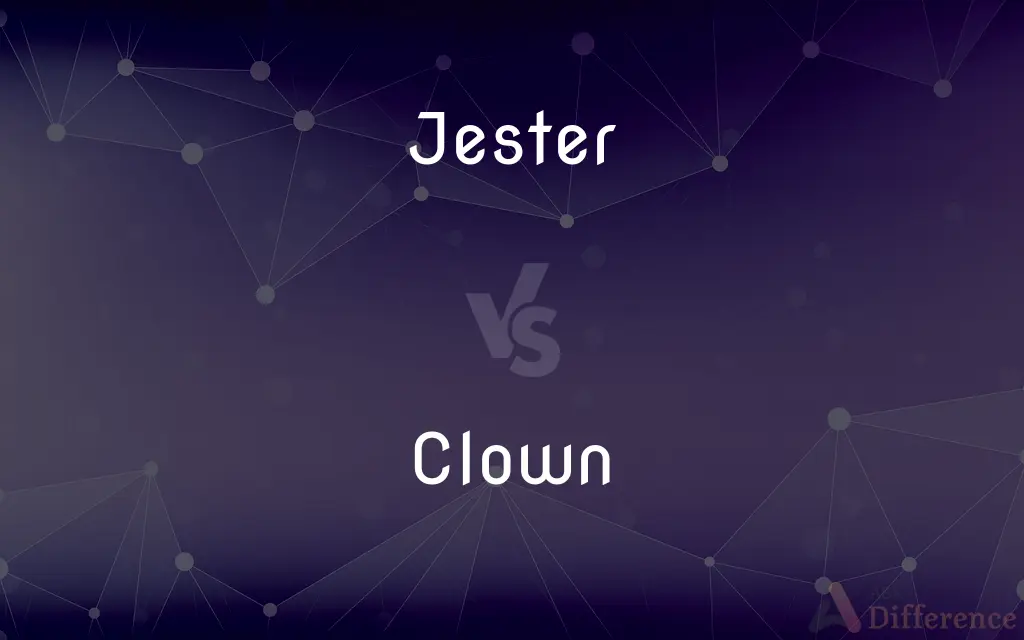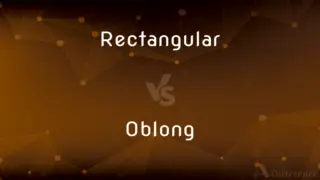Jester vs. Clown — What's the Difference?
By Tayyaba Rehman & Fiza Rafique — Updated on September 14, 2023
A jester is a historical figure who entertained nobility and is often associated with wit and satire. A clown is a performer in modern circuses and events, typically characterized by comedic antics and colorful attire.

Difference Between Jester and Clown
Table of Contents
ADVERTISEMENT
Key Differences
A jester is primarily a historical figure that was employed to entertain kings, queens, and courts during medieval times. They often used satire, comedy, and music to amuse their audience. A clown, on the other hand, is a modern-day performer usually found at circuses, birthday parties, or public events, engaging in physical comedy, juggling, or even acrobatics.
The roles of jesters and clowns are rooted in comedy, but their mediums and audiences differ significantly. A jester was a permanent part of the court and frequently had the freedom to mock even the rulers to some extent, using wit and satire. Clowns perform for general audiences and their acts are usually more physical, less verbal, and devoid of political satire.
In terms of attire, a jester often wore a unique, colorful costume topped with a three-pointed hat, each point ending in a small bell. Clowns, conversely, are recognized by their bright, exaggerated costumes and makeup, which are intended to be eye-catching but not necessarily rooted in historical tradition.
Grammatically, both "jester" and "clown" serve as nouns, and they can be converted into verbs, as in "to jest" and "to clown around." However, the word "jester" carries a certain historical weight and can have connotations of wit and verbal acuity, whereas the word "clown" has a broader application and can sometimes be used derogatorily to imply foolishness or buffoonery.
Comparison Chart
Time Period
Historical
Modern
ADVERTISEMENT
Audience
Nobility, court
General public
Type of Comedy
Wit, satire
Physical comedy, antics
Costume
Specific attire with three-pointed hat
Bright, exaggerated costumes and makeup
Grammatical Usage
Noun, can be verb ("to jest")
Noun, can be verb ("to clown around")
Compare with Definitions
Jester
A historical entertainer for nobility.
The jester amused the king with his wit.
Clown
A modern performer in circuses or parties.
The clown juggled and made balloon animals.
Jester
A character found in medieval settings.
The jester was a staple in the royal court.
Clown
An entertainer specializing in physical comedy.
The clown slipped on a banana peel for laughs.
Jester
A comedian who often used music.
The jester played the lute to accompany his jokes.
Clown
A character known for colorful, exaggerated attire.
The clown's bright red nose caught everyone's attention.
Jester
A figure given leeway to mock authority.
The jester was the only one who could insult the king.
Clown
Sometimes used derogatorily to imply foolishness.
Stop acting like a clown; this is serious!
Jester
A performer skilled in satire and wit.
The jester often made political jokes.
Clown
A clown is a person who wears a unique makeup-face and flamboyant costume, performing comedy in a state of open-mindedness (by reversing folkway-norms) all while using physical comedy.
Jester
A jester, court jester, or fool, was historically an entertainer during the medieval and Renaissance eras who was a member of the household of a nobleman or a monarch employed to entertain guests. Jesters were also itinerant performers who entertained common folk at fairs and town markets.
Clown
A comic entertainer, especially one in a circus, wearing a traditional costume and exaggerated make-up
A circus clown
Jester
A professional joker or ‘fool’ at a medieval court, typically wearing a cap with bells on it and carrying a mock sceptre.
Clown
An individual skilled in juggling or acrobatics.
The clown amazed the audience with his tightrope act.
Jester
One given to jesting.
Clown
An unsophisticated country person; a rustic.
Jester
A fool or buffoon at medieval courts.
Clown
Behave in a comical or playful way
Harvey clowned around pretending to be a dog
Jester
One who jests, jokes or teases.
Clown
A buffoon or jester who entertains by jokes, antics, and tricks in a circus, play, or other presentation.
Jester
A person in colourful garb and fool's cap who amused a medieval and early modern royal or noble court.
Clown
One who jokes and plays tricks.
Jester
Any of various nymphalid butterflies of the Southeast Asian genus Symbrenthia.
Clown
A coarse, rude, vulgar person; a boor.
Jester
A buffoon; a merry-andrew; a court fool.
This . . . was Yorick's skull, the king's jester.
Dressed in the motley garb that jesters wear.
Clown
A peasant; a rustic.
Jester
A person addicted to jesting, or to indulgence in light and amusing talk.
He ambled up and downWith shallow jesters.
Clown
To behave like a buffoon or jester.
Jester
A professional clown employed to entertain a king or nobleman in the middle ages
Clown
To perform as a buffoon or jester.
Clown
To krump, especially in clown makeup.
Clown
A slapstick performance artist often associated with a circus and usually characterized by bright, oversized clothing, a red nose, face paint, and a brightly colored wig.
Clown
A person who acts in a silly fashion.
He was regarded as the clown of the school, always playing pranks.
Clown
A stupid or badly-behaved person.
Clown
(obsolete) A man of coarse nature and manners; an awkward fellow; an illbred person; a boor.
Clown
(obsolete) One who works upon the soil; a rustic; a churl; a yokel.
Clown
A clownfish.
Clown
To act in a silly or playful fashion.
Clown
To ridicule.
Clown
A man of coarse nature and manners; an awkward fellow; an ill-bred person; a boor.
Clown
One who works upon the soil; a rustic; a churl.
The clown, the child of nature, without guile.
Clown
The fool or buffoon in a play, circus, etc.
The clown shall make those laugh whose lungs are tickle o'the sere.
Clown
To act as a clown; - with it.
Beshrew me, he clowns it properly indeed.
Clown
A rude or vulgar fool
Clown
A person who amuses others by ridiculous behavior
Clown
Act as or like a clown
Common Curiosities
What is a Clown?
A clown is a modern performer, typically in circuses, known for physical comedy and colorful attire.
Did Jesters have specific costumes?
Yes, jesters typically wore unique, colorful costumes with a three-pointed hat.
Who did Jesters perform for?
Jesters primarily performed for nobility and the royal court.
Do Clowns wear makeup?
Yes, clowns often wear exaggerated makeup as part of their costume.
Where can you find Clowns performing?
Clowns perform in a variety of settings like circuses, parties, and public events.
Do Jesters and Clowns perform music?
Jesters often incorporated music, while clowns may or may not include music in their act.
Are Jesters and Clowns both comedians?
Both jesters and clowns are rooted in comedy, but their styles and audiences differ.
Is "Jester" a noun or a verb?
"Jester" is primarily a noun but can also be a verb as in "to jest."
Were Jesters allowed to mock kings?
Often, jesters had the unique freedom to mock and satirize authority figures.
What is a Jester?
A jester is a historical figure who entertained nobility, often using satire and wit.
Is the concept of a Jester European?
The concept of a jester is often associated with European medieval courts.
Can Jesters and Clowns be female?
Both jesters and clowns can be of any gender, although historically jesters were often male.
Is "Clown" ever used derogatorily?
Yes, the term "clown" can sometimes imply foolishness or buffoonery.
Is "Clown" a noun or a verb?
"Clown" is primarily a noun but can also be a verb as in "to clown around."
Are Clowns a global phenomenon?
Yes, the concept of clowns exists in various cultures around the world.
Share Your Discovery

Previous Comparison
Oval vs. Ovular
Next Comparison
Rectangular vs. OblongAuthor Spotlight
Written by
Tayyaba RehmanTayyaba Rehman is a distinguished writer, currently serving as a primary contributor to askdifference.com. As a researcher in semantics and etymology, Tayyaba's passion for the complexity of languages and their distinctions has found a perfect home on the platform. Tayyaba delves into the intricacies of language, distinguishing between commonly confused words and phrases, thereby providing clarity for readers worldwide.
Co-written by
Fiza RafiqueFiza Rafique is a skilled content writer at AskDifference.com, where she meticulously refines and enhances written pieces. Drawing from her vast editorial expertise, Fiza ensures clarity, accuracy, and precision in every article. Passionate about language, she continually seeks to elevate the quality of content for readers worldwide.













































